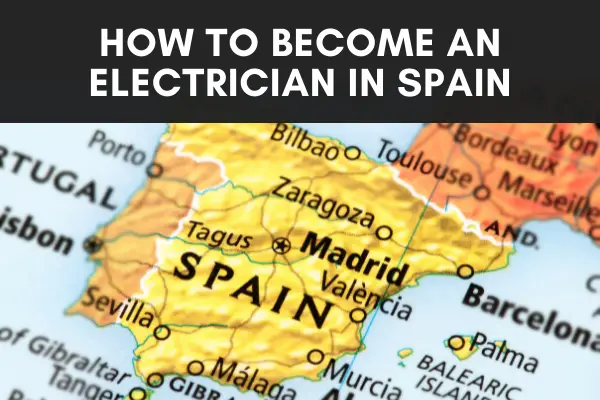Spain is known for its tapas, pleasant weather, and enjoyable social life. While it may not be a hotspot for employment opportunities, electricians are in high demand across the country.
To become an electrician in Spain, you’ll need to either have sufficient education or professional experience. The acceptable education experience includes a university degree (bachelor’s), Superior Formacion Profesional (FP) certificate (apprenticeship), or a Certificate of Professionalism in the trade. Sufficient professional experience must be either 3 years (2,000 hours) of applicable work experience or at least 300 hours of applicable unaccredited education.
This article will further break down each way to become an electrician in Spain from start to finish.
Types of Electricians in Spain
There are two main categories of electricians in Spain: Basic Electricians (IBTB) and Specialty Electricians (IBTE). This article will further discuss the steps to becoming a certified basic electrician. Do note that most links source Andalusia’s guidelines for electricians, so be sure to double-check those in your autonomous community if elsewhere.
Basic electricians install, maintain, and repair electrical low-voltage installations.
Specialty electricians can install, maintain, and repair electrical installations that correspond to distribution systems, control and data acquisition systems, premises at risk of fire or explosion, operating and emergency rooms, high-voltage lighting and signs, and more.
Unlike most states in the U.S., there is no formal licensing procedure for independent electricians in Spain. Instead, the company or person that employs the electrician will need to fill out a Responsible Party Declaration form through their Autonomous Community. This declaration states that they have the proper proof and documentation showing their electricians are qualified to perform electrical work in the country while following local laws.
Becoming an Electrician in Spain Through Education
If you are a resident or citizen of Spain, you can begin your career as an electrician through formal education. This is the standard – and perhaps the safest – way to become a certified electrician in the country.
You have three options for this journey: attend university, complete a 2-year Superior FP program, or receive a Certificate of Professionalism.
University for Spanish Electricians
If you attend university and receive a bachelor’s degree related to electrical work or engineering, you qualify as an IBTB basic electrician. You can then be hired by a professional company or self-declare your certification if working as an independent contractor (autonomo).
Spanish Electricians with FP
FPs can include basic FPs, Middle FPs, and Superior FPs. While some companies may hire an electrician with only a Middle FP certificate, Superior FP programs are preferred for electricians in Spain and we will focus on those below.
Superior FP programs in Spain are similar to apprenticeship programs in the U.S. They are typically two years long (2000 hours) and include both classroom hours and 6+ months of hands-on experience at an internship or apprenticeship. The hands-on hours may or may not be paid. Many students are hired by their apprenticeship employers after completing their FP program.
The standard Superior FP program for aspiring electricians is called an “FP en electricidad y electronica” or “FP in Electricity and Electronics.”
To apply to an FP, you must be at least 18 years old and have completed ONE of the following:
- Have graduated high school (called Bachiller in Spain)
- Hold a Técnico Grado Medio FP degree
- Hold a Técnico Superior FP degree
- Have a bachelor’s degree
Once you meet the requirements, you can find accredited FP programs in your area and apply independently.
Certificate of Professionalisms for Electricians in Spain
Certificates of Professionalism are given according to the standards of Spain’s National Professional Qualifications Catalog. These certificates are valid and accepted across all communities in Spain, and they can be received in one of two ways.
Firstly, you can pass a series of modules specific to electrical work to obtain your certificate. You must have the knowledge and experience necessary to pass such modules.
Second, you may also apply for the certificate by demonstrating your applicable professional and non-accredited educational experience.
To apply for a Certificate of Professionalism, begin here.
Becoming an Electrician in Spain Through Experience
If you have received informal training or unaccredited education in electrical work, you can also become an IBTB basic electrician. To do so you’ll need to go through the Professional Competency Accreditation process, called the Acreditación de Competencias Profesionales.
To apply for this accreditation, you’ll need to prove at least 3 years’ experience (or 2,000 hours) working in the electrical field over the last 15 years. If you’re applying through educational experience, you’ll need to prove that you’ve completed at least 300 classroom hours in the last 10 years.
This process varies by autonomous community, so you must look up the process specific to where you are residing and plan to work.
Electrician Job Duties in Spain
Electricians in Spain have similar responsibilities as electricians elsewhere, but they must abide by local laws in their autonomous community and city.
Generally, Spanish electricians can:
- Complete electrical installations in homes, offices, industrial warehouses, etc.
- Maintain and repair electric systems
- Interpret and carry out plans to install wiring
- Assemble and install low-voltage distribution networks
- Mount the equipment and pipes associated with electrical automated installations and telecommunications infrastructure in buildings
- Work with budgets, technical documentation, and administrative documentation related to electrical projects
Electrician Salaries in Spain
While the quality of living may be high, salaries in Spain are not. General electricians in Spain earn an average of €1,440 per month, or €17,300 per year. If you’re new to Spanish salaries, don’t let that number scare you – the average net salary per month in Spain for all workers is slightly lower, at €1,408. This means most electricians can live normally when factoring in the lower cost of living.
In Summary
The standard electrician in Spain is called an IBTB basic electrician. To be IBTB certified, you can either complete the required education or apply for accreditation through your work or non-accredited educational experience.
Formal education requirements to be an IBTB electrician include holding a bachelor’s degree, Superior FP certificate, or Certificate of Professionalism in the electrical field.
To apply for accreditation through experience, you’ll need either 3 years of work experience in the field or at least 300 hours of applicable coursework.

